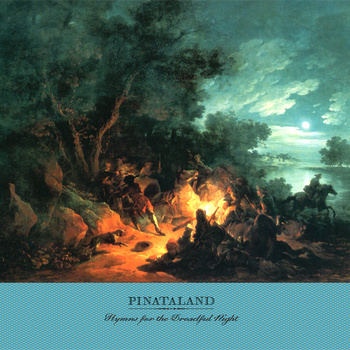 As far as marketing systems are concerned, you probably couldn’t have done worse than Pinataland. In Hollywood, nothing about them is high-concept or easy to summarize. For instance, the band’s name itself suggests something punky, slightly pastel and filled with candy; certainly not emblematic of the “history folk” scene they’re commonly associated with. And there’s another lump: history folk? Folk music based on actual events is the history of folk itself, but few examples rise to become perennially adored. Mostly, the mind flashes upon preachy, screechy screeds that warn of orphaned babies (they’re always “babies” in these songs, aren’t they?) of backwoods martyrs caught in the machinery of The Man.
As far as marketing systems are concerned, you probably couldn’t have done worse than Pinataland. In Hollywood, nothing about them is high-concept or easy to summarize. For instance, the band’s name itself suggests something punky, slightly pastel and filled with candy; certainly not emblematic of the “history folk” scene they’re commonly associated with. And there’s another lump: history folk? Folk music based on actual events is the history of folk itself, but few examples rise to become perennially adored. Mostly, the mind flashes upon preachy, screechy screeds that warn of orphaned babies (they’re always “babies” in these songs, aren’t they?) of backwoods martyrs caught in the machinery of The Man.
Not that this is a recipe for disaster all the time, but the form and the formula became so intertwined over time that you wouldn’t be faulted for cringing at the thought of Pinataland’s latest, Hymns for the Dreadful Night, being a deadly drag. Obviously aware of the circumstances, primary songwriters Doug Stone and David Wechsler strove to make it otherwise and have mostly succeeded.
Opening with the somber “The Dreadful Night,” the listener is taken in by the beautiful singing, the piano and the uncluttered arrangement, but starts to worry if the ensuing nine tracks follow that same path. Perhaps as a way to assure the listener to hang in there, second track “Island of Godless Men” decides to kick up a little dust. My own understanding of history can be spotty at best so I don’t know the facts behind the song. Interpretation suggests the story of a perhaps falsely accused Irishman (owing to the Celtic flavor of the jig) rounded up, shipped off and left in an Australian exiles’ damnation. It could have been a turgid mess but, instead, “Island of Godless Men” kinda rocks.
The same goes for “The Death of Silas Deane” which has more of a gypsy demeanor about it and probably the best lyric of an album with several great lyrics: “I knocked on every marquee’s door, I prowled every street, but damn me if I did not save the receipt.” The closing “Cemetery Mink” is a rock song, albeit a slow-tempo one performed on acoustic instruments, and ends the disc with a deep, dramatic bow. Strangely, although it really sounds nothing like it, my best example would be how “City of Dreams” closes the Talking Heads album True Stories.
What these energetic songs do for the more sedate, some would say traditional-sounding, material is to draw the audience in to the lyrics. This is a problem I have had with some of the folk/Americana acts lately; a consistency of tone and purpose causes the material to wash over in one quick burst and who cares what was said? It all creaked of sentiment and nostalgia for times the participants could never have experienced. Sure, they love that music and that’s fine, but I found myself checking out when I felt like the singers were putting me on. I also would chafe when artists (some of whom are very respected in the folk pantheon) used their art as an artless pulpit and beat you to death with their earnestness. “We’re serious here! This is tragic stuff! Don’t you dare tap that foot!”
Not with Pinataland. Mixing up “Hungry Angel” and “Border Guard” with the wonderfully weird “Hiawatha”(to which I dare you not to tap your foot) or the moderately mournful “The Oldest Band in Town” made me appreciate those somewhat bygone stylistic flashes even more. I also appreciate how the vocals mesh, not deadlocked (which is a style I tend to love) but very casual and loose. When Stone and singer Robin Aigner go at it, the sound has a warm, live feel. Hymns for the Dreadful Night is the best “live” album recorded in a studio format.
Pinataland has been around for a few albums and, based on the strength of Hymns for the Dreadful Night, I’m going to need to give them a listen.
Hymns for the Dreadful Night is available from their website, Pinataland.com.






Comments